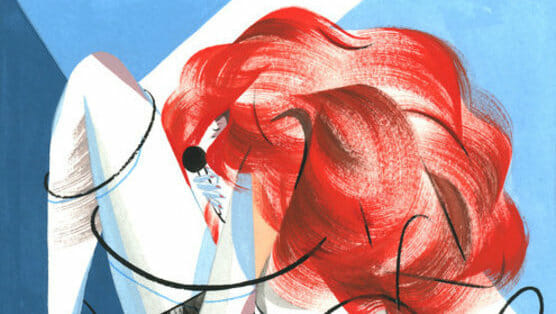Wonderland by Stacey D’Erasmo
Illustration by Ping Zhu
Capturing music on the page can be difficult. Get too technical and only rock geeks understand what you write. Get too impressionistic, and you come across as pretentious. This could explain why the musical passages in Stacey D’Erasmo’s new rock ‘n’ roll road novel Wonderland appear uncanny … because they actually succeed.
D’Erasmo is many things—a cultural critic, a novelist, a professor of writing—but she has never been a musician. Yet read to her description of Wonderland’s narrator, Anna Brundage, a fading rock star attempting a risky comeback tour across Europe, as she launches into her set list:
I am there. I blow the song through the back of the rickety concert hall and out into the night, folded, gleaming, fast, faster, unbroken, alive, whirling inside the secret chamber, rose and gold, unstoppable, irresistible, straight into the veins, hair-raising. I take another breath.
I’ve never heard performance described in quite this way. At first glance, the choice of words sounds almost unmusical. But then I consider Anna, and her language seems appropriate, almost inevitable.
Anna is bigger than life. She has a shock of red hair and she shreds her electric guitar. She made me think of Florence Welch of Florence and the Machine, mixed with a little bit of Janis. Onstage, her voice rips from her throat like a fado singer. She recognizes the “importance of the unheard chord, the chord that is never played, the chord that happens after the music ends. … It’s the sound you don’t quite hear, the reverberation coming off the top or the side or the edges of the note. Not a silence but a potential sound, a space exactly the shape of what the sound is about to be. Invisible, inaudible, and yet revelatory, what finishes and composes the sequence retrospectively: you discover that it was all going, in the end, toward the chord that isn’t heard but is only anticipated. Which is to say, the last chord happens in the mind of the listener, as if he is remembering a sound, which in reality he has never heard before. The unheard chord feels like, must feel like, a memory.”
Again, at first glance, the description seems unmusical. But again, consider Anna… after all, she fairly rips her way through Europe, leaving in her wake good gigs, bad gigs, temporary lovers and lots of booze. She earns the right to describe her sound any way she pleases.
D’Erasmo’s book has more going on than just rock ‘n’ roll. For starters, Anna has a lot on her interpersonal plate: a problematic relationship with her artist father, a problematic relationship with her prosaic sister, a laissez-faire attitude toward casual sex (Anna represents something rare in fiction—a female, 40-something, sexually satisfied narrator) and a mysterious affair with a married man named Simon.
She faces deconstruction and dissonance everywhere. The breakage can be literal, as in the case with her father, an artist primarily famous for ripping apart buildings and a train for art’s sake. We meet Anna’s sister, Lila, a quintessential good girl who chose marriage and motherhood over creativity. (She judges her sister for choosing the path less taken.) And Anna, of course, plays her unheard chords. Wonderland gives us much to chew on, but the supremely skillful narration makes all of it manageable.
-

-

-

-

-

-

-

-

-

-

-

-

-

-

-

-

-

-

-

-

-

-

-

-

-

-

-

-

-

-

-

-

-

-

-

-

-

-

-

-








































